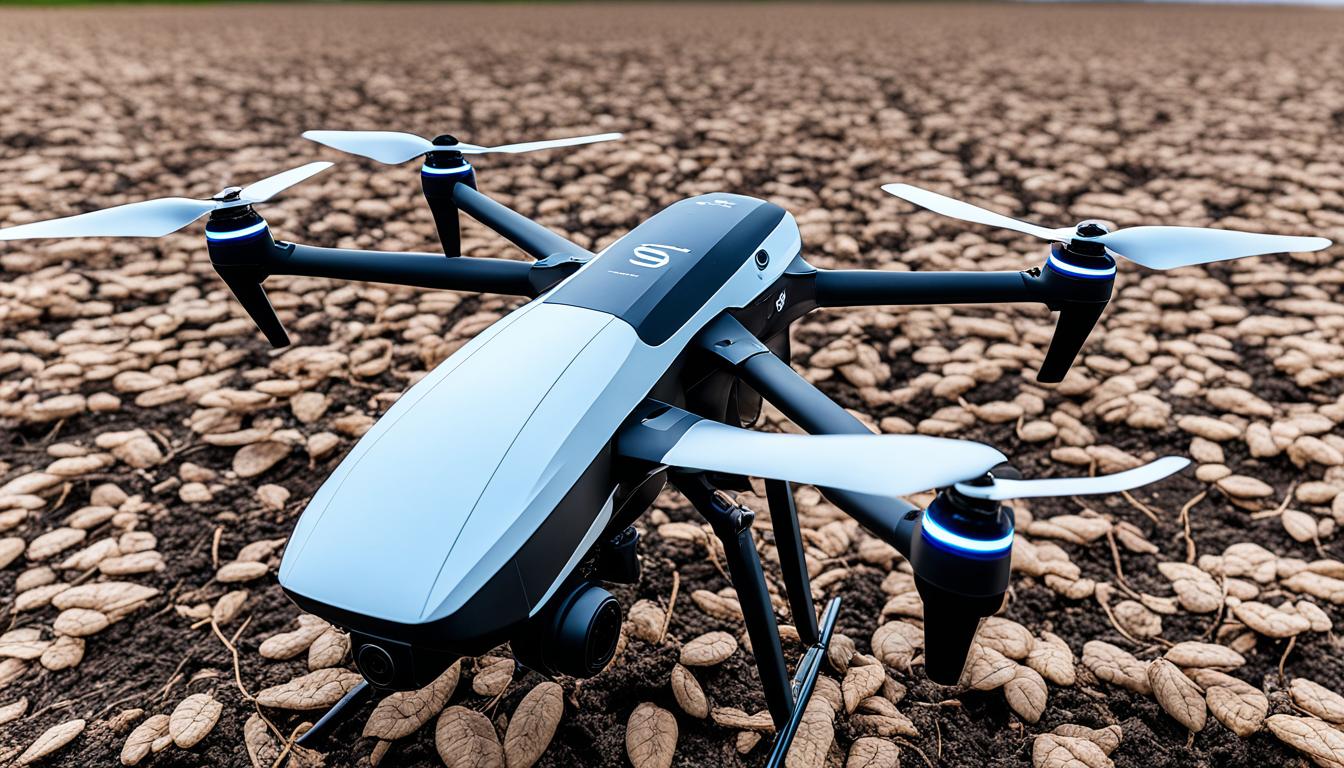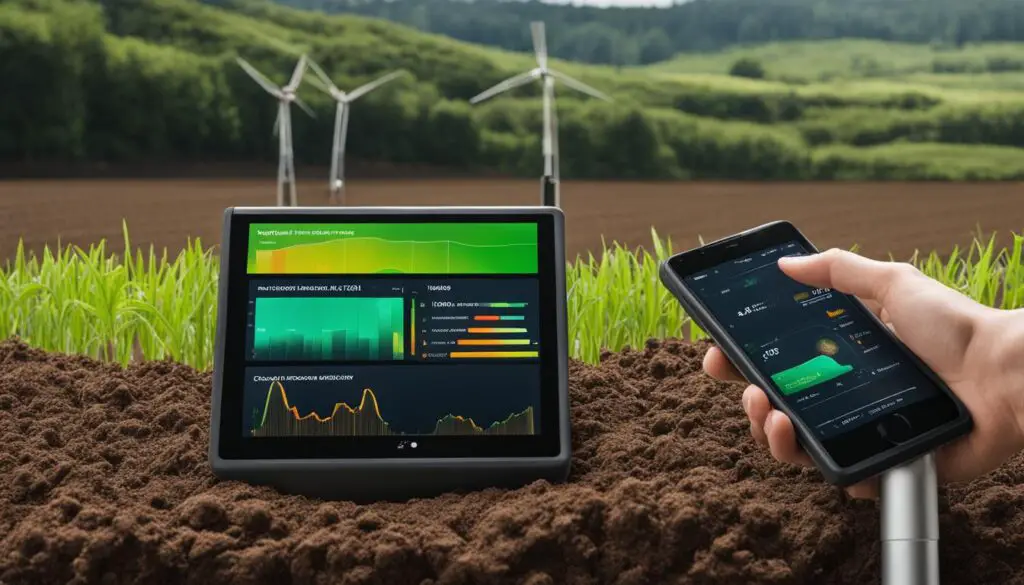
I am excited to share with you how AI is revolutionizing agriculture by playing a critical role in soil health monitoring. As the demand for natural resources continues to increase, it is crucial to find sustainable practices that will safeguard our planet for future generations. AI technology is driving innovation in this area, offering a range of solutions that are transforming the way we monitor soil health.
Research from the University of Southern California and other reputable sources has shown the immense potential of AI in changing the agricultural industry. By harnessing the power of AI, farmers can gather real-time data on soil conditions, including moisture levels, nutrient content, and pH levels. This valuable information allows them to make informed decisions and optimize irrigation and fertilization practices for maximum yield and minimal resource waste.
Furthermore, AI algorithms can detect early signs of soil degradation and nutrient deficiencies, enabling proactive intervention to prevent crop yield losses. Through continuous monitoring, AI in soil health management ensures that farmers can take appropriate action at the right time, resulting in healthier soil and better crop productivity.
Key Takeaways:
- AI technology is revolutionizing agriculture by transforming soil health monitoring.
- Real-time data collection on soil conditions allows farmers to optimize irrigation and fertilization practices.
- AI algorithms can detect early signs of soil degradation and nutrient deficiencies, preventing crop yield losses.
- Continuous monitoring with AI ensures healthier soil and improved crop productivity.
- The future of AI in soil health monitoring looks promising, with advancements in sensors and drones for comprehensive field insights.
The Benefits of AI in Soil Health Monitoring
The use of AI in soil health monitoring brings numerous benefits to the agricultural sector. Data from the University of Southern California and other sources show that AI technology enables farmers to gather real-time data on soil conditions, including moisture levels, nutrient content, and pH levels. AI algorithms can analyze this data and provide insights on optimal irrigation and fertilization practices, helping farmers maximize crop productivity while minimizing resource waste.
One of the key advantages of AI in soil health monitoring is its ability to detect signs of soil degradation and nutrient deficiencies. By continuously monitoring soil conditions, AI can alert farmers to potential issues before they significantly impact crop yields. This proactive intervention allows farmers to take effective measures, such as adjusting nutrient application or implementing soil conservation practices, to prevent crop yield losses.
Furthermore, AI technology in soil health monitoring plays a crucial role in promoting sustainable agriculture. By optimizing irrigation and fertilization practices, AI helps reduce water and fertilizer usage, leading to more efficient resource utilization and minimizing the environmental impact. This not only benefits crop yields and farmers’ profitability but also contributes to long-term soil health and conservation.

Overall, the integration of AI technology in soil health monitoring revolutionizes the way farmers approach agricultural practices. It provides real-time data, valuable insights, and proactive intervention, resulting in improved crop yields, sustainable resource management, and environmental conservation. As AI continues to advance and more farmers adopt this technology, the benefits for sustainable agriculture are expected to increase further.
The Future of AI in Soil Health Monitoring
The future of AI in soil health monitoring looks promising. Experts from the University of Southern California and other institutions predict that AI technology will continue to advance, enabling more sophisticated monitoring and analysis of soil conditions. By harnessing the power of AI, farmers will be able to gain deeper insights into their soil’s health and make data-driven decisions to maximize productivity and sustainability in their agricultural practices.
AI-powered sensors and drones are being developed to collect data from large-scale agricultural fields, providing comprehensive insights into soil health across vast areas. These technological advancements will allow farmers to monitor soil conditions in near-real-time, identify potential issues, and take proactive measures to mitigate risks. With AI’s ability to process large amounts of data quickly, farmers can optimize irrigation and fertilization practices, ensuring optimum nutrient levels and reducing water and resource waste.
Furthermore, as AI continues to evolve, it holds the potential to revolutionize the way sustainable agriculture is practiced. By analyzing historical and real-time data, AI algorithms could help farmers identify trends and patterns related to soil health, weather conditions, and crop performance. This knowledge will enable farmers to implement precision farming techniques, where resources such as water, fertilizers, and pesticides are used more efficiently, resulting in improved crop yields and reduced environmental impact.
FAQ
How does AI technology contribute to soil health monitoring?
AI technology enables farmers to gather real-time data on various soil conditions, including moisture levels, nutrient content, and pH levels. This data can be analyzed by AI algorithms to provide insights on optimal irrigation and fertilization practices, helping farmers maximize crop productivity while minimizing resource waste.
What are the benefits of using AI in soil health monitoring?
Using AI in soil health monitoring brings numerous benefits to the agricultural sector. It allows farmers to gather real-time data on soil conditions, detect signs of soil degradation and nutrient deficiencies, and take proactive measures to prevent yield losses. AI technology also aids in resource optimization, helping farmers achieve higher crop yields while promoting environmental sustainability.
How does AI technology contribute to sustainable agriculture?
AI technology revolutionizes agricultural practices by providing accurate data on soil health and conditions. This empowers farmers to make informed decisions regarding irrigation, fertilization, and proactive interventions. By optimizing resource utilization and minimizing waste, AI contributes to sustainable agriculture practices that promote long-term environmental health.
What is the future outlook for AI in soil health monitoring?
Experts predict that AI technology will continue to advance, allowing for more sophisticated monitoring and analysis of soil conditions. This will result in increased precision and efficiency in agricultural practices, leading to improved yields and environmental sustainability. Additionally, the development of AI-powered sensors and drones will enable comprehensive data collection from large-scale agricultural fields, providing valuable insights into soil health on a larger scale.
Source Links
- https://www.scientificamerican.com/article/scientists-are-putting-chatgpt-brains-inside-robot-bodies-what-could-possibly-go-wrong/
- https://ktar.com/
- https://www.mdpi.com/2077-1312/12/3/448








